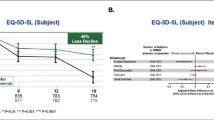Abstract
The objective of the study was to investigate whether cognitive and behavioural impairment in Amyotrophic Lateral Sclerosis (ALS) contributes to caregiver burden, and whether carer burden affects patient outcome. Thirty-three dyads of incident patients with ALS and their primary caregivers (n = 33) completed a series of measures to determine cognitive and behavioural profiles, (patients) and carer burden (carers) to investigate the psychological impact of ALS, and the impact of behavioural change since the onset of ALS. Caregivers were divided into high- and low-burden groups using previously established norms. High burden in carers was associated with significantly higher apathy (p = 0.009), disinhibition (p = 0.005), and executive dysfunction (p = 0.015) in patients. Regression analyses for burden confirmed significant predictors such as change in apathy (r = 0.390, F = 5.19, p = 0.03), disinhibition (r = 0.530, F = 11.32, p = 0.002), and executive dysfunction (r = 0.372, F = 4.66, p = 0.039), with total behaviour change contributing to 31 % of caregiver burden (r = 0.563, F = 4.17, p = 0.015). Total distress as measured by the Hospital Anxiety and Depression Scale was also a significant predictor of caregiver burden, contributing to 38.5 % of variance (r = 0.621, F = 18.79, p < 0.000). Caregiver burden did not affect survival (p = 0.496). Caregiver burden in ALS is modulated by patient’s cognitive and behavioural status, but does not significantly impact patient survival.

Similar content being viewed by others
References
Elamin M, Phukan J, Bede P et al (2011) Executive dysfunction is a negative prognostic indicator in patients with ALS without dementia. Neurology 76:1263–1269
Chio A, Gauthier A, Calvo A, Ghiglione P, Mutani R (2005) Caregiver burden and patients’ perception of being a burden in ALS. Neurology 64:1780–1782
Gauthier A, Vignola A, Calvo A, Cavallo E, Moglia C, Sellitti L, Chio A (2007) A longitudinal study on quality of life and depression in ALS patient–caregiver couples. Neurology 68:923–926
Mioshi E, McKinnon C, Savage S, O’Connor CM, Hodges JR (2013) Improving burden and coping skills in frontotemporal dementia caregivers: a pilot study. Alzheimer Dis Assoc Disord 27:84–86
Elamin M, Bede P, Byrne S, Jordan N, Gallagher L, Wynne B, O’Brien C, Phukan J, Lynch C, Pender N, Hardiman O (2013) Cognitive changes predict functional decline in ALS: a population-based longitudinal study. Neurology 80:1–8
Bruletti G, Comini L, Scalvini S, Morini R, Luisa A, Paneroni M, Vitacca M (2014) A two-year longitudinal study on strain and needs in caregivers of advanced ALS patients. Amyotroph Lateral Scler (in press)
Chio A, Gauthier A, Montuschi A et al (2004) A cross sectional study on determinants of quality of life in ALS. J Neurol Neurosurg Psychiatry 75:1597–1601
Rabkin JG, Wagner GJ, Del Bene M (2000) Resilience and distress among amyotrophic lateral sclerosis patients and caregivers. Psychosom Med 62:271–279
Thommessen B, Aarsland D, Braekhus A, Oksengaard AR, Engedal K, Laake K (2002) The psychological burden on spouses of the elderly with stroke, dementia and Parkinson’s disease. Int J Ger Psych 17:78–84
Mioshi E, Caga J, Lillo P, Hsieh S, Ramsey E, Devenney E, Hornberger M, Hodges JR, Kiernan MC (2014) Neuropsychiatric changes precede classic motor symptoms in ALS and do not affect survival. Neurology 82:149–155
Grossman AB, Woolley-Levine S, Bradley WG, Miller RG (2007) Detecting neurobehavioral changes in amyotrophic lateral sclerosis. Amyotroph Lateral Scler 8:56–61
Lillo P, Mioshi E, Zoing MC, Kiernan MC, Hodges JR (2011) How common are behavioural changes in amyotrophic lateral sclerosis? Amyotroph Lateral Scler 12:45–51
Phukan J, Elamin M, Bede P et al (2012) The syndrome of cognitive impairment in amyotrophic lateral sclerosis: a population-based study. J Neurol Neurosurg Psychiatry 83:102–108
Brooks BR, Miller RG, Swash M, Munsat TL (2000) El Escorial revisited: revised criteria for the diagnosis of amyotrophic lateral sclerosis. Amyotroph Lateral Scler Other Motor Neuron Disord 1:293–299
Zarit SH, Reever KE, Bach-Peterson J (1980) Relatives of the impaired elderly, correlates of feelings of burden. Gerontologist 20:649–655
Schreiner AS, Morimoto R, Arai Y, Zarit S (2006) Assessing family caregiver’s mental health using a statistically derived cut-off score for the Zarit Burden Interview. Aging Mental Health 10(2):107–111
Ankri J, Andrieu S, Beaufils B, Grand A, Henrard JC (2005) Beyond the global score of the Zarit Burden Interview: useful dimensions for clinicians. Int J Geriatr Psychiatry 20:254–260
Cohen SR, Mount BM, Strobel MG, Bui F (1995) The McGill Quality of Life Questionnaire: a measure of quality of life appropriate for people with advanced disease: a preliminary study of validity and acceptability. Palliat Med 9:207–219
Grace J, Malloy PF (2001) Frontal systems behaviour scale: professional manual. Psychological Assessment Resources Inc, Lutz
Moorey S, Greer S, Watson M et al (1991) The factor structure and factor stability of the hospital anxiety and depression scale in patients with cancer. Br J Psychiatry 158:255–259
Norton S, Cosco T, Doyle F, Done J, Sacker A (2013) The Hospital Anxiety and Depression Scale: a meta confirmatory factor analysis. J Psychosom Res 74(1):74–81
IBM Corp. Released 2012. IBM SPSS Statistics for Windows, Version 21.0. Armonk, NY: IBM Corp
Acknowledgments
The research leading to these results has received funding from the European Community’s Seventh Framework Programme (FP7/2007-2013) under grant agreement no (259867); the JPND SOPHIA project; Irish Health Research Board (CSA2012/11) and the Irish Institute of Clinical Neuroscience (12549. 201616).
Conflicts of interest
Nothing to declare.
Ethical standard
This research has received ethical approval from Beaumont Hospital Medical Research Ethics review team, and written consent was obtained from all participants.
Author information
Authors and Affiliations
Corresponding author
Rights and permissions
About this article
Cite this article
Burke, T., Elamin, M., Galvin, M. et al. Caregiver burden in amyotrophic lateral sclerosis: a cross-sectional investigation of predictors. J Neurol 262, 1526–1532 (2015). https://doi.org/10.1007/s00415-015-7746-z
Received:
Revised:
Accepted:
Published:
Issue Date:
DOI: https://doi.org/10.1007/s00415-015-7746-z




